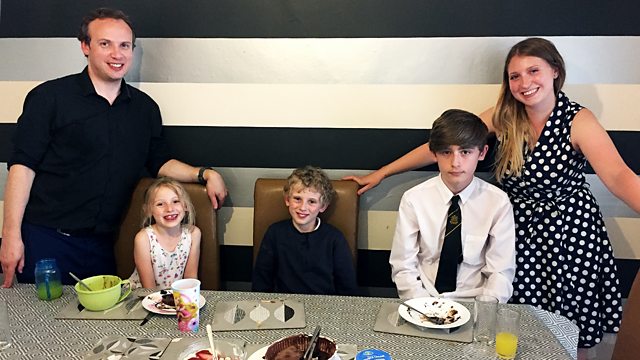How We Eat: 4. Eating as a Family
In the last programme in a four-part series about how we eat now, Sheila Dillon explores the reality and the myth of eating as a family.
In this final programme of the series How We Eat, Sheila Dillon explores eating as a family, the reality and the myth. As working hours increase and with both parents working, it becomes more and more difficult to sit down together with the children for meals. Separate meals, often in front of the tv, are more the reality in Britain today.
But in this programme Sheila meets two families who believe that there is nothing more important than eating together. The Parker family have two children of their own, but they have also fostered dozens of children, some with special needs. Crucial to the success of their extended family, they believe, is the fact that they sit together every night at six o'clock round the table to eat. Sheila Dillon joins them to find out why this structure is so important to the children they look after. She visits too the Brooks family, who sit down together every Friday night for the Jewish Friday night dinner. Emma Brooks married into Judaism and found it strange at first; she reflects on the demands but also the benefits of this ritual meal.
So what exactly can family meals do for us? Sheila talks to best-selling child psychologist Steve Biddulph whose books ("Raising Boys", "Raising Girls") are in 4 million homes, and finds out why he thinks eating together is crucial if you want to solve conflict and raise happy children. He gives his top tips for successful family meals. But many people, Sheila included, remember dreadful family rows over the childhood dinner table. With historian Chris Kissane, the programme explores whether the family dinner, like the perfect family itself, has always been more of a myth than a reality.
Last on
More episodes
How to enjoy family meals
In a world where family eating often means 5 or 6 different ready meals, heated in a microwave and eaten in front of a screen, how canwe change our habits and does it matter?
Steve Biddulph, child psychologist, one of the world’s best known parent educators, and author of best-selling Secrets of Happy Children, Raising Girls, and Raising Boys thinks it does matter…& has some tips.
1. Even if you can’t do it every night, eating together as a family three or four times a week makes a big difference to everyone’s happiness and behaviour.
2. Everyone over nine is responsible for a meal once a week. (They can team up or get help if they want, but it’s their responsibility). And whoever is cooking gets to choose what their meal will be.
3. Little kids should fetch and carry and help clean away, according to what’s safe for their age.
4. Turn off the TV and radio etc for dinner so that people can tune in to each other and the food.
5. Don’t talk serious stuff - make it light and easy. No interrogation, no family issues. Joke, share experiences, enjoy the food!
6. Leave phones to charge away from the table - adults as well, and don't answer them if they ring.
Credits
| Role | Contributor |
|---|---|
| Presenter | Sheila Dillon |
| Interviewed Guest | Emma Brooks |
| Interviewed Guest | Steve Biddulph |
| Interviewed Guest | Christopher Kissane |
Broadcasts
- Sun 22 Oct 2017 12:32�������� Radio 4
- Mon 23 Oct 2017 15:30�������� Radio 4
Download this programme
Subscribe to this programme or download individual episodes.
Can comfort foods really make you feel better?
Yes they can, says Sheila Dillon.
Podcast
-
![]()
The Food Programme
Investigating every aspect of the food we eat


